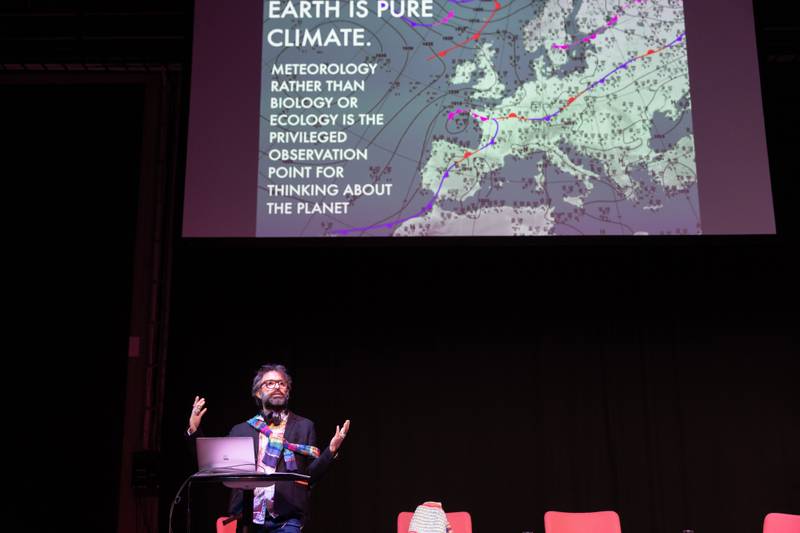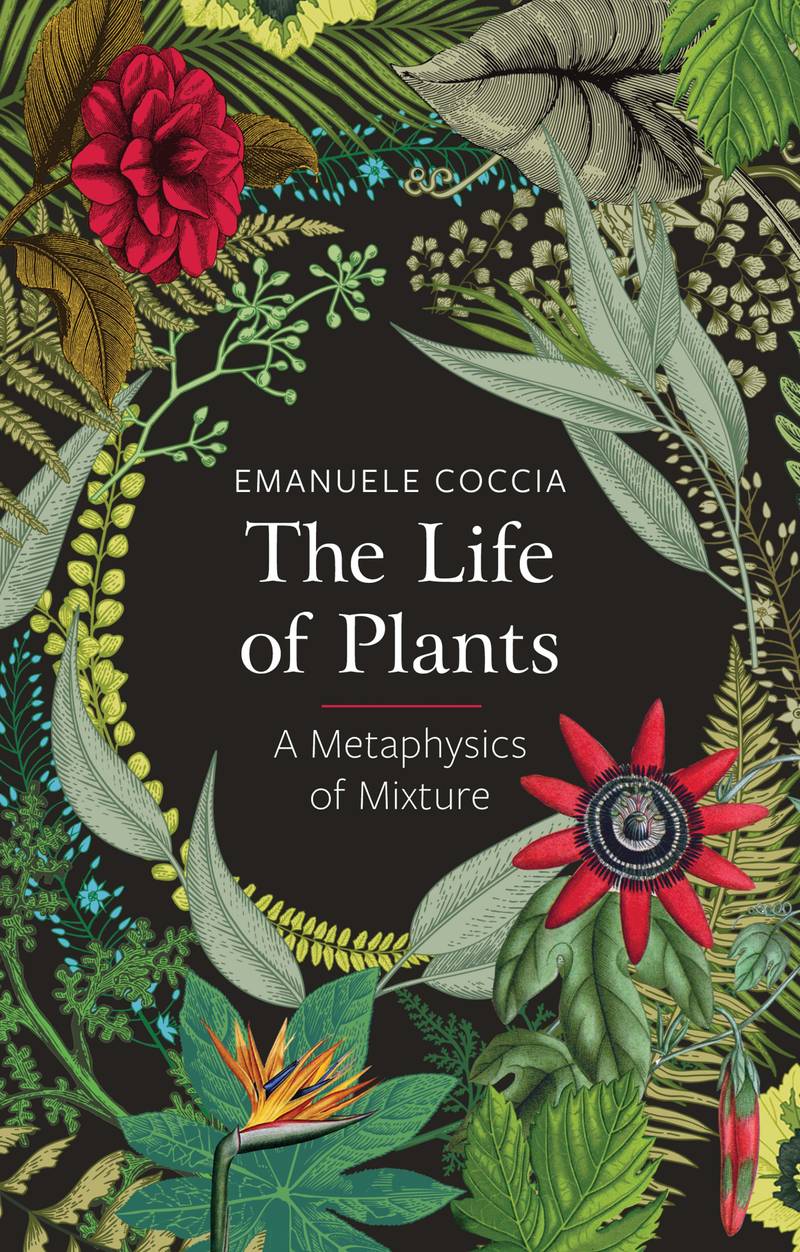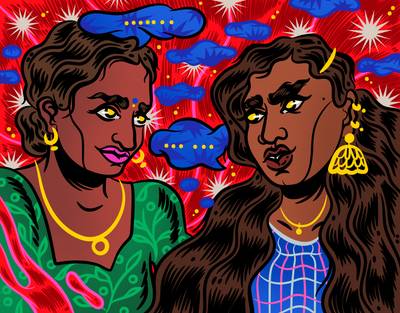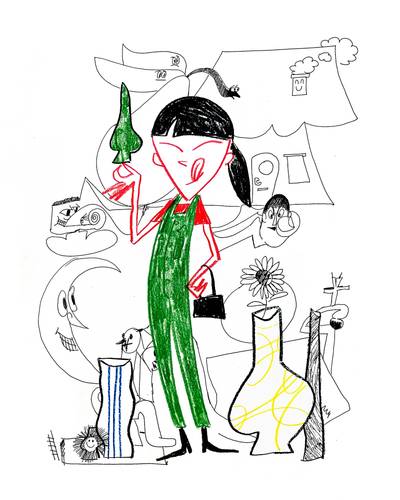

Emanuele Coccia at keynote lecture ‘Don’t Call Me Gaia: Notes for a Planetary Art’, Photo by Wilma Hurskainen
Joss Allen can be found in the garden, amongst the weeds and compost heaps. He is an artworker and amateur gardener interested in how art influences ecological ways of being and practices of care towards more-than-human worlds. Recently, he was co-artistic director of ATLAS Arts (Scotland) with Yvonne Billimore. Joss is currently doing a PhD on seed saving and seed libraries.
Following his Saastamoinen Foundation and Academy of Fine Arts keynote talk the night before, Don’t Call Me Gaia: Notes for a Planetary Art,1 I caught up with philosopher Emanuele Coccia in a downtown Helsinki hotel. Having become aware of his work through the publication of his book, The Life of Plants, I was keen to learn more about his relationship with plants and how it has influenced his current thinking and research. His talk the night before raised several questions for me, particularly around the use of names for mobilisation and collective action on a global scale. Our discussion was rich and challenging, and although we found common ground through our interest in plant life, we diverged on many points. If disagreements can be generative, when is it necessary to find commonality? Is this the task of nomenclature? When does a name create the conditions of possibility to work together, and when is it an act of possession? I’m less sure than before the conversation, which perhaps is a good thing.


The Life of Plants book cover, Image courtesy of Polity Publishing.
JOSS: I want to start with a shared point of interest – plants. How did you begin attending to plants in your work, and how did that lead to your book, The Life of Plants? I grew up in a small village where my parents had a large garden in which they grew food. From an early age, I was surrounded by plants. Still, I realise now that I didn’t really pay attention to them—what some people have been calling “plant blindness”,2 which is more like ecological ignorance because it is not seeing the connection, the interdependencies that sustain life/death and in which plants are vital.
EMANUELE: It’s always difficult to express how our love starts. There is a beautiful quote by the Italian botanist Stefano Mancuso: “Love for animals is for everybody; love for plants is for adults”. I had the chance to spend five years in an agricultural school where everybody was focused on plants’ life, needs, and metabolism. When I was very young, I had this almost unconscious imprint or idea that every knowledge should focus on plants more than on human beings or animals. I got to study what they call the technology of husbandry, which I found boring as I don’t like animals so much. But, at the same time, this schoolwork played a significant role because it gave me a lot of plant knowledge. After the agricultural school, I went to study philosophy, and I kept reading a little about this stuff, but I kept it hidden. I decided to write a book on plants and growth precisely when everybody started to think that plants are marvellous beings.
It was well-timed.
Yeah, but it was unpleasant because I was working on totally different stuff. I was working on the history of marketing and advertising and writing this book in my spare time because I needed to combine these two parts of my life. I conceived of this book as something very personal and a little bit hidden in my career. But then it came out exactly when everybody was speaking about plants, and it exploded in my hands, and in a way, I was a little bit kidnapped by this focus.
What I wanted to say is that I don’t like the term “plant blindness” because it’s a way to put our relationship with other beings on a sort of biological roots, which is stupid.
I guess it is ableist.
Yeah, it’s stupid because, first of all, why should we be like our ancestors millions of years ago? Secondly, this way, we cannot measure that the problem is not in our genes or our history; the problem is that everything in the city, in modern cities, is done in order to hide how plants grow and how dependent on them we are. It is a question of the organisation of space. We organise space in a way to hide this existence or to transform it into something purely decorative. This is why, in my opinion, the main problem is not a metaphysical one but an architectural one. It’s not a biological problem.
We cannot measure that the problem is not in our genes or our history; the problem is that everything in the city, in modern cities, is done in order to hide how plants grow and how dependent on them we are. It is a question of the organisation of space. We organise space in a way to hide this existence or to transform it into something purely decorative. This is why, in my opinion, the main problem is not a metaphysical one but an architectural one.
It’s much more a question of culture in the sense of how space is shaped: how many times are you obliged in your day to meet with someone who is not your form? The second big problem is how we think of agriculture. I remember when I was in school, it was social exile; now, agriculture is a bit cooler. But even today, there is a huge prejudice against agriculture and industrial agriculture. We are socially accusing agriculture and farmers of being the ones who are using poison all the time. We forget that the chemical revolution in the 19th century was a condition of possibility. Without the Industrial Revolution, we could not spend so much time doing things other than producing our food.
That’s why it’s so complicated; on the one hand, we must change the system; on the other hand, this high productivity rate is so important for society. We now have a level of food democracy, which is crazy. We cannot denounce it today because it would be impossible to say, "No, you are not allowed to eat this kind of stuff”. Or, in Helsinki, for instance, how can bananas be found here? At the same time, we cannot come back to a war where you can only eat what theoretically, from a natural point of view, is possible or can grow in your ecosystem. It is quite a complicated problem. We are accusing agriculture in such a violent way.
Yeah, particularly when farmers are cast as caretakers of particular landscapes. Caretaking is perhaps not the right word either. It creates a certain kind of relationship of care between things that tends to fix them in place rather than seeing them as dynamic and changing. It is also a huge pressure to put on one group of people.
Yeah, to say they are responsible for everything.
Law, rather than individual morality, should solve some problems. The law also functions through fines when you have to spend money. For example, when you park, it’s not a criminal or penal law. The question is not how you respond to yourself but how you’re responding to something beyond your responsibility.
Yeah, although not all in the same way, humans are complicit in their choices. But it’s definitely not to individualise it either.
This is an even bigger question. Like every other issue today, the ecological issue is transformed into a moral one, whereby it’s purely political. The question is not individual behaviour but what the law allows and forbids. The problems can be solved by law and not by moral attitude, because if we always translate our problems into a question of morality, we are putting huge pressure on individuals. And secondly, we are impeding ourselves from solving a problem. Imagine that in a country, you have issues of criminality, and instead of putting laws in place and saying, if you kill someone, you’re going to prison, you’re saying you should not kill someone else. It’s up to you. You know what I mean? It’s not a question of consciousness.
I tend to disagree, partly because I don’t believe in this kind of carceral logic, first of all, as a way to solve problems.
Law, rather than individual morality, should solve some problems. The law also functions through fines when you have to spend money. For example, when you park, it’s not a criminal or penal law. The question is not how you respond to yourself but how you’re responding to something beyond your responsibility.
Maybe we can bring this back to plants for a moment. Do you think there is a relationship between vegetal thinking and politics?
Perhaps you should define what you mean. Politics is the fact that you’re engaging and transforming something, which can be an idea, a behaviour, a compulsory element, or a community of people you have never met. And whom you probably will never meet. I’m totally against the nation-state, but at the moment, politics means parliaments; it means laws. So, doing politics means lobbying; you’re sitting in parliament to make laws. We should stop using this word so badly that it doesn’t mean anything. Now we transform the very important feminist slogan, “everything is political”, into something that doesn’t mean anything. Now, people are thinking that even writing on Facebook is political. No. To make politics means sitting in a parliament and transforming the laws that oblige people to act in one way or another. If someone writes on plants and says, “I’m doing politics”, they are just wrong. This is just arrogance; this is not politics. There is a huge problem in our society because many people claim to do politics without doing politics.
There will always be people denying the climate crisis. Perhaps it’s difficult to find a name, but we have to strive and keep searching. And this attitude, which is every single name that ancient and modern cultures have given is good, is very dangerous because it’s a very conciliatory attitude.
Let’s talk a bit about your talk last night, particularly around your proposal for finding a new name for the Earth as a vital step in addressing the climate and ecological crises.
The names we have are not enough. We have to invent a new name. I don’t have a solution, but I know that we have to find a name. One of the points I make is that nowadays, we are in a situation where everybody’s saying we have to stay with or listen to this kind of multiplicity of proposals, the multiverse, and this is politically extremely naïve. We are in a multiverse, but what do we do with Putin? Do you know what I mean?
If we accept that every name of the Earth and every conception of it is good, what do we do with climate deniers? We have to negotiate a common initial name; otherwise, we cannot be sure, and we cannot impose, that we are all on the same planet. In a way, this is also what Bruno Latour was saying in the last part of his life: We have to unify the planet we are living on because otherwise, there will be, first of all, civil war. And secondly, there will always be people denying the climate crisis. Perhaps it’s difficult to find a name, but we have to strive and keep searching. And this attitude, which is every single name that ancient and modern cultures have given is good, is very dangerous because it’s a very conciliatory attitude.
Is there not a problem with this attempt to universalise something? What about how a name can also obscure things? It can obscure certain ways of knowing. For example, what about Swedish botanist Carl Linnaeus’s way of naming plants and how that was an attempt to try and create this common language in which we could know plants through this name, but arguably, it also erased a whole load of ways of knowing plants.
Are you sure?
People name and have relationships with plants based on taste, how they smell, their touch, their potential as food or medicine, and their place within a community, and then this system places them purely on how they look. These binominal names have to do with how they look or the person who “discovered them”.
The question is not whether a system is good or not. The question is: do we need one name or not? You cannot criticise Linnaeus because the names are not good. The question you raised is a different one: Do we need one name or more than one name? And then, of course, we have to choose if we need one name and whether it is a good one. But they are two different questions. You cannot use one argument for the other question. Of course, how the names were chosen is totally crazy and stupid.
I don’t know if you have ever done real botanical research. To go everywhere in the world and try to understand if this culturally significant plant is precisely the same plant you met in another culture. To do that, you need a common name. It’s to neglect the evidence that we must share because the oneness of a name is the condition of the possibility of sharing something.
There is a huge amount of work by artists criticising just everything because they say the unit, the one name, has deleted, as you said, a huge amount of other names. Again, it’s a consolatory position because it’s the position of someone who never had to work with a single plant. If you are serious about saying no, we must maintain every name a plant has, and then it becomes technically impossible. First, to respect everyone and maintain a kind of justice, you would have to collect every name, even the ones that are not yet there. Everyone has their own tradition, but it’s important to produce something—a space, a platform where all those knowledges can come together. I don’t know why, instead of discussing such an abstract topic, we are not, for instance, producing books that bring together all this knowledge about plants. That is much more interesting.
I think sometimes the art world—not just the art world—polarizes the field. It’s not because of science that those stories are disappearing. It’s because of political issues linked to modernity, which are extremely complex in history.
There are also a lot of artists who are incredibly knowledgeable about plants and spend a lot of time getting to know them, whether through scientific or other means. I think it is important that the histories around these things don’t get erased or forgotten about. Deeper histories connected to colonialism and the displacement of people from land or knowledges matter. Something artists are attending to.
The question of collecting histories that are disappearing is a different one. There is now a knowledge that allows people to know that we are all speaking about the same plant: a practice of the production of knowledge called science, which produces a different kind of knowledge that others cannot make.
I think sometimes the art world—not just the art world—polarizes the field. It’s not because of science that those stories are disappearing. It’s because of political issues linked to modernity, which are extremely complex in history.
Real knowledge about plants is hard; it’s difficult, and only for some. An animal is so warm and nice; a plant doesn’t give a fuck about you. How can you trigger a real love, not a love based on moral issues or guilty feelings? Real curiosity is so rare.
And finally, this is something you are working on, right, around love?
I’m working on love, but just among human beings. I am working on how love is already going beyond patriarchy. There are many new forms of experimentation of love in our society, and yet, there is not so much discourse about this.







